For the past four centuries, corporations have exploited — butchered — the African continent, leaving behind scars, open wounds and entrails which can be seen from space. The history of the continent could be told as one of corporate rule briefly interrupted by colonialism or, as the late novelist and scholar Ngugi wa Thiong’o put it, of “corpolonialism”.
South Africa’s past and present exemplifies this. The Cape was colonised by a corporation, which then imported enslaved people to provide labour and enable the Dutch East India Company to lay the material and symbolic foundations for the regime of white supremacy and racial domination that culminated in apartheid.
When slavery was no longer profitable, and so the British decided to “abolish” it, the empire “expropriated” enslaved people across it colonies and formally freed them — but not before paying £20 million pounds in compensation to white slaveholders and their creditors in the name of “justice and equity”. These “reparations”, paid to white people for the end of slavery, were then reinvested through the new corporate vehicle of the joint-stock company. They were used to finance further colonial expansion and consolidate white domination over land, labour and lives, globally.
In the Cape colony, for example, white compensation for black “emancipation” quintupled the money in circulation in the economy; more than doubled imports and exports; financed the violent settler expansion on the colony’s eastern “frontier” and led to the establishment of its first private bank in 1837. The number of joint-stock companies in the Cape doubled, as white beneficiaries of “emancipation” pooled their compensation to generate more wealth.
White former slaveholders leveraged their land, capital and credit to re-subordinate the newly freed “apprentice” labourers and become rent-seeking slumlords. The greatest beneficiary of the trade in compensation claims — the London-based merchant house of Phillips, King & Co. — financed the exploration of copper in Namaqualand, drawing a line from “compensated emancipation” to the mining and extractive monopolies that emerged after the discovery of diamonds and gold.
The consolidation and expansion of this three-headed hydra of white supremacy, corporate interests and state power throughout the latter half of the 19th century is epitomised in the figure of Cecil John Rhodes. This race-state-company nexus was also central to the system of colonial apartheid that emerged over the course of the 20th century.
Rhodes’s successors — who controlled as much of the economy as the apartheid state — were joined by the various corporations established under the volkskapitalisme, many of which dominate the continent today. As the Truth and Reconciliation Commission concluded: “Business was central to the economy that sustained the South African state during the apartheid years. Certain businesses … were involved in helping to design and implement apartheid policies … Most businesses benefited from operations in a racially structured context.”
This unholy trinity of white supremacy, corporate interest and state power is not unique to South Africa. Its global articulation was on full display in the White House two weeks ago as the world’s most powerful statesman, the world’s wealthiest man and rich white men who chase white balls around for a living put on a spectacular performance of ignorance, entitlement and victimhood.
One after another, US President Donald Trump invited each of these unelected white men to roll back the years and weigh in on the present conditions and future prospects of the majority of people in South Africa, who were once again being held hostage to the delusions of a white minority. The ball-hitters obliged, literally speaking over Cyril Ramaphosa, the democratically elected president of South Africa, and Zingiswa Losi, the leader of the country’s largest trade union federation, Cosatu.
It was all too much for golfer Ernie Els, who momentarily forgot which side he was on and thanked the US for its support in maintaining apartheid. It was the most honest moment of the whole spectacle.
President Trump’s corporate handler, Elon Musk, loomed large but said nothing. Rather, his ransom was delivered by South Africa’s second richest man, Johann Rupert, who declared that he had opposed apartheid from birth — as long as he had benefited from it. He said South Africa must abandon its insistence that corporations operating in South Africa — which for centuries have worked hand-in-glove with colonial apartheid to advance the interests of a white minority — should include a mere 30% ownership stake for the majority of South Africans. This would allow Musk’s Starlink — a central part of the US military-industrial complex — to not only colonise space but recolonise the continent.
Another demand, made explicit in Trump’s recent executive order, is that white beneficiaries of centuries of racial domination who have amassed an absurdly disproportionate amount of the privately owned land (and wealth) should — like their slave-owning forebearers — once more be compensated in the name of “justice and equity”, regardless of whether the land was “justly” acquired and is being “equitably” used, or even used at all.
Social movements, activists and affected communities have been working to hold corporations to account for their depredations on the continent since the 1900s. An early and instructive example is the work of South Africa’s own Alice Kinloch, a pathbreaking pan-Africanist and pioneer of the field of business and human rights, who was born in the Cape in 1863 and moved to Kimberley in the 1870s.
In the final years of the 19th century, Kinloch pointed out that: “The handsome dividends that a certain company pays are earned at the price of blood and souls of … black men. Shareholders may be in happy ignorance of this, so we would remind them that there are several thousands of fellow-men kept under lock and key for their sole benefit, and that the gems on their wives’ hands, and the finery bought by their ‘profits’ are, to ‘seeing’ eyes, bespattered with human gore.”
Kinloch proceeded to set out “the state of affairs in South Africa, for which the bloody, brutal and inconsiderate hands of avarice and might are answerable”, where “[f]or more than a quarter of a century Kimberley has been the stage for the worst forms of undisguised inhumanity” at the hands of “their master the Company”. In doing so she pointed to the race-corporation-state nexus, noting that De Beers was “a company as ostentatiously ‘colour-hating’ as its chief, Cecil Rhodes”.
Kinloch established the African Association in 1897, which organised the first Pan African Conference in 1900. The resolutions of that conference included a call for direct action in respect of “the situation of the native races in South Africa”, including the “degrading and illegal compound system of native labour in vogue in Kimberley”.
The work of Alice Kinloch and her fellow pan-Africans should serve not only to inspire us but instruct us. Last week, social movements, activists and affected communities met in Johannesburg for the 7th African Regional Indaba on a Binding Treaty on Business and Human Rights organised by the Centre for Applied Legal Studies, the Alternative Information & Development Centre and Lawyers for Human Rights. The treaty negotiation process began in 2014 following a resolution by the Human Rights Council — co-sponsored by South Africa — to “elaborate an international legally binding instrument to regulate, in international human rights law, the activities of transnational corporations and other business enterprises”.
The future of the treaty is uncertain, as efforts towards corporate accountability more generally are backsliding everywhere. Both the US and the EU are rolling back what little controls they had in place to regulate the actions of corporations. Countries of the Global South are being put under immense pressure to ease regulations to facilitate the second “scramble for Africa” under the banner of a “green transition” that relies on minerals the West has declared “critical”.
In South Africa, the Competition Commission is appealing a decision of the competition appeal court which effectively neutered the commission’s capacity to hold companies operating beyond our borders accountable for the negative impact of illegal activities in the republic. The appeal arises from the commission’s efforts to prosecute the largest banks in the world — whose market capitalisation exceeds $2 trillion, some of which were founded with the compensation paid to white slaveholders — for the coordinated manipulation of the rand.
The competition appeal court’s 2024 decision threw out the case against 17 of the 28 banks before they had even responded to the allegations. When the Centre for Applied Legal Studies requested permission to intervene as an amicus curiae to place the banks’ conduct within the framework of domestic and international human rights law, the constitutional court refused our application.
In the face of these challenges, we must continue to hold the line on corporate accountability for what Kinloch rightly described “handsome dividends … earned at the price of blood and souls”, including through defending the treaty process, which has been led from the outset by the Global South.
Like Kinloch, we must also insist on a continental response, including by supporting the African Commission on Human and Peoples’ Rights’ efforts to draft an African regional treaty to regulate the activities of transnational corporations. Four centuries of impunity for corpolonialism is enough.
Professor Christopher Gevers is the director of the Centre for Applied Legal Studies and an associate professor at the School of Law, Wits University.
6 Jun, 2025 | Admin | No Comments
What I Spent: The therapy you actually get for £100, £50, or free on the NHS


While there are options available through the NHS, many people in the UK will have to pay out of pocket for talking therapy.
According to services marketplace Bark, this will set you back an average of £60 per session. But it all depends on the type of therapy you have, where you’re based, and the provider you go for — and to make it extra ambiguous, many don’t tell you their rates until you get in touch.
Then there’s weighing up the cost for each visit versus the long-term outlay. For example, while certain therapeutic methods may seem more expensive, you may only need a limited number of sessions, so it could work out cheaper overall compared to ongoing counselling.
It’s important to do your research beforehand, as clinical psychologist Marianne Trent explains: ‘I’m aware of some people (even unqualified people) charging £300 plus per session and coaching sessions can be astronomical too!’
Who can call themselves a therapist?
The titles therapist, counsellor, psychologist and psychotherapist are not protected in the UK, meaning anyone can legally describe themselves as such without specific qualifications.
However, organisations like the British Psychological Society do register certain professionals – like clinical psychologists and chartered psychologists – while the British Association for Counselling and Psychotherapy (BACP) and the UKCP (United Kingdom Council for Psychotherapy) provide voluntary regulation and ethical guidelines for therapists.
When choosing a therapist, it can give you peace of mind to check if they’re registered with one of these professional bodies – and always make sure to check their training, experience, and adherence to ethical frameworks.
The fact is though, professional support can be invaluable, and only you can decide whether the results are worth the investment — especially if you need to be seen urgently and can’t cope with a long NHS waiting list.
So if you’re considering it, these three Metro readers’ experiences can give you a better idea of what you can expect to spend.
£100 a session
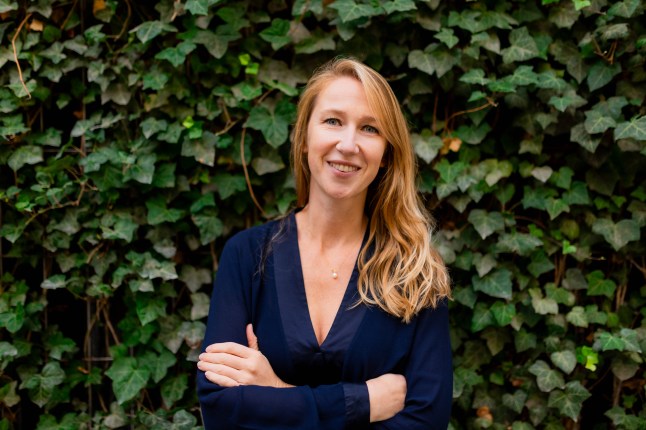
Dina Grishin, 39, is a career coach and coaching psychologist based in London, spending £100 on each 50-minute session she has with an EMDR therapist trained in the Polyvagal approach.
‘This is a combination I’ve been looking high and low for so I’m happy I found her, even though this is the most I’ve ever spent on a therapist,’ Dina tells Metro.
‘I’ve been seeing her nearly weekly for a few months now (we’re on session 10) but it’s not therapy that will last years so knowing there’s an end date this year – perhaps within a couple of months – also helps justify the cost.’
Additionally, she used to visit an EFT therapist once every three to eight weeks (‘on a “when needed” basis after working more intensely at the beginning’) paying £90 for each 90-minute session. And prior to that, she paid £60 per session for CBT and £50 for talking therapy.
EMDR, EFT and CBT
EMDR
Eye Movement Desensitisation and Reprocessing – is a psychological therapy that can help people who are affected by traumatic memories.
According to the NHS, EMDR – which is recommended by NICE – for the treatment of PTSD – uses one of two ways to process the memory: tapping from side to side and moving your eyes from side to side.
Polyvagal-informed EMDR would see these methods used alongside the outlook that our autonomic nervous system (ANS) can shape our responses to trauma.
EFT
‘Emotional Freedom Technique uses the art of tapping on acupuncture pressure points to release negative emotions,’ explains the Greater Manchester Mental Health Foundation website. ‘It has proved effective in reducing anxiety and improving overall wellbeing. EFT is often described as ‘like acupuncture without
the pins”.’
CBT
Cognitive behavioural therapy involves working with a therapist to help you change your thoughts and behaviour. Available through the NHS or privately, it’s suitable for a range of different mental health conditions, and typically is offered in courses 5 to 15 sessions.
£75 a session
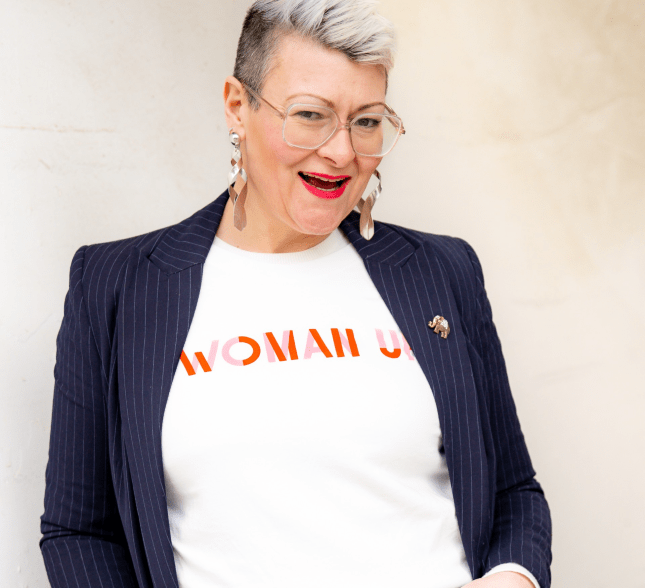
Personal stylist Abbey Booth, 49, has been visiting a CPD certified hypnotherapy and anxiety coach, Jo – who charges £75 for 60 minutes – around once or twice a month for the last eight months.
A spate of menopause-related anxiety and panic attacks led the Herts-based mum to seek out regular support, but she also books additional sessions when things are especially difficult, to help give her the tools to cope.
In fact, she’s so impressed with her ‘brilliant’ therapist, she paid for her son to see Jo when he was dealing with exam stress.
Alongside working with Jo, Abbey recently began having ADHD coaching at a price of £150 for a block of three 45-minute sessions too.
She tells Metro: ‘During busy times I can get inertia/blocks or hyper focus, so It’s really helped with coping strategies when the noise gets too much and I need time away to recalibrate and refocus.
‘These sessions are run online and I’ve been having them for a few months. There’s also contact in between via email and voice notes – brief check-ins which I find very useful.’
Hynotherapy, anxiety coaching and ADHD coaching
Hypnotherapy
This type of therapy uses hypnosis to try to treat conditions or change habits. It can help people work through a range of issues, but the NHS recommends avoiding it ‘if you have psychosis or certain types of personality disorder, as it could make your condition worse.’
Anxiety coaching
‘An anxiety coach is someone who guides people out of anxiety using a structured, effective approach,’ says the STILL Method website.
It adds that while this coaching technique is ‘not therapy’, many find it to be ‘therapeutic.’
ADHD coaching
Like anxiety coaching, this is more about helping people with ADHD to develop their own strategies and skills to manage their daily lives, work, and relationships. Coaches provide guidance in areas like executive functioning, organisation, and time management, either through set sessions or ‘when needed’ advice.
Free on the NHS

Johnny Seifert, 32, from London, previously underwent seven sessions of private counselling at £50 per 55-minute appointment, but found he would often end up ‘talking almost for the sake of talking, without being given any coping mechanisms to help actually make a difference.’
After asking his GP for help with his anxiety, the host of mental health podcast Secure the Insecure was referred for an assessment with the NHS. Three months later, he had a phone consultation, and two weeks after this, was offered eight weekly group therapy sessions over Zoom.
However, Johnny was unable to attend these lunchtime calls due to work commitments and was looking for something ‘more one on one’, so requested an alternative option.
Around a month later, he was then offered a six-week programme of Self Guided Help. This involved Johnny working through a booklet and going through his behaviours with a Trainee Psychological Trainee Practitioner in 30-minute weekly phone sessions.
‘Each week, 24 hours before the session, I am sent a questionnaire that has a risk assessment and assesses my anxiety levels,’ he tells Metro.
Towards the start, the course specifically focused on ‘validating’ what Johnny was feeling. Now on session four, he’s progressed to learning tools ‘such as Worrying Time Management to manage the time you actually worry’ – which he says has been ‘really useful’.
‘As it’s on the NHS, I do sometimes feel that I am just a number,’ says Johnny. ‘It’s very much about the present week rather than looking into past traumas and triggers of where the worrying (in my case) has come from, understanding those root causes so that the behaviours do not happen again in the future.’
Do you have a story to share?
Get in touch by emailing MetroLifestyleTeam@Metro.co.uk.
4 Jun, 2025 | Admin | No Comments
Free school meals to be extended to 500,000 chilldren across the country


All pupils in England whose families are on Universal Credit will be eligible for free school meals from the 2026/27 academic year.
Currently households on Universal Credit must earn below £7,400 a year (after tax and not including benefits) to qualify.
But following pressure from campaigners and education leaders, the Department for Education (DfE) has announced the change which is set to benefit more than half a million pupils.
It has suggested this will lift 100,000 children out of poverty.
Education secretary Bridget Phillipson said: ‘It is the moral mission of this government to tackle the stain of child poverty.
‘Today this government takes a giant step towards ending it with targeted support that puts money back in parents’ pockets.
‘From free school meals to free breakfast clubs, breaking the cycle of child poverty is at the heart of our Plan for Change to cut the unfair link between background and success.
‘We believe that background shouldn’t mean destiny. Today’s historic step will help us to deliver excellence everywhere, for every child and give more young people the chance to get on in life.’
Phillipson, who grew up on free school meals, described the move as a ‘gamechanger’ on the BBC’s Today programme.
She added: ‘It’s my moral mission to make sure that fewer children in our country grow up in poverty – I experienced it myself growing up, it is personal to me.’
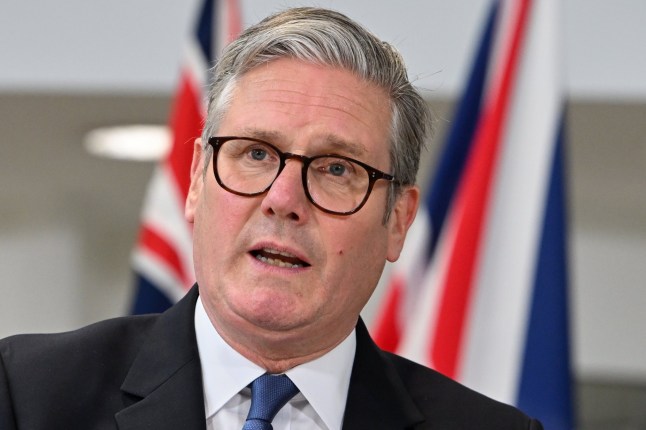
Prime Minister Sir Keir Starmer hailed the expansion as a ‘truly historic moment for our country’.
Writing for the Mirror, he said: ‘It will put £500 in parents’ pockets, help children achieve at school, and ease cost-of-living pressures.’
Around 1 in 4 of all pupils (24.6%) – 2.1 million – were eligible for free school meals in January 2024.
This is an increase of 75,000 pupils from January 2022, when 2 million (23.8%) were eligible.
The number of pupils who are on free school meals has been on the increase since 2017/18.
Factors like the Covid pandemic in 2020 resulted in a notable increase.
Some regions have shown higher increases over the years, including the West Midlands and London.
Number of pupils on free school meals in England
2022/23: 2,019,509 pupils
2021/22: 1,897,449 pupils
2020/21: 1,737,598 pupils
2019/20: 1,440,788 pupils
2018/19: 1,270,941 pupils
2017/18: 1,106,633 pupils
2016/17: 1,128,403 pupils
2015/16: 1,142,043 pupils
Liberal Democrat Education spokesperson Munira Wilson said the move was a ‘victory for thousands of passionate campaigners’ but added: ‘This can only be a first step.
‘To end the cost of learning crisis, the government needs to commit to auto-enrolling eligible children for free school meals, lifting the two-child benefit cap, and capping uniform costs to truly change to lives of children in poverty.’
The government’s child poverty strategy had been due for publication in the spring but has been delayed until autumn in time for the budget.
Kate Anstey, head of education policy at the Child Poverty Action Group (CPAG) charity, said she hopes this announcement is ‘a sign of what’s to come in autumn’s child poverty strategy’.
Nick Harrison, chief executive of the Sutton Trust social mobility charity, said: ‘This is a significant step towards taking hunger out of the classroom.
‘Children can’t learn effectively when hungry, so this announcement not only helps to tackle the effects of child poverty, but will also likely help improve education outcomes for disadvantaged young people.
‘Giving free school meals to all families who are eligible for universal credit is also easier for parents to understand, so has the potential to increase take-up rates.’
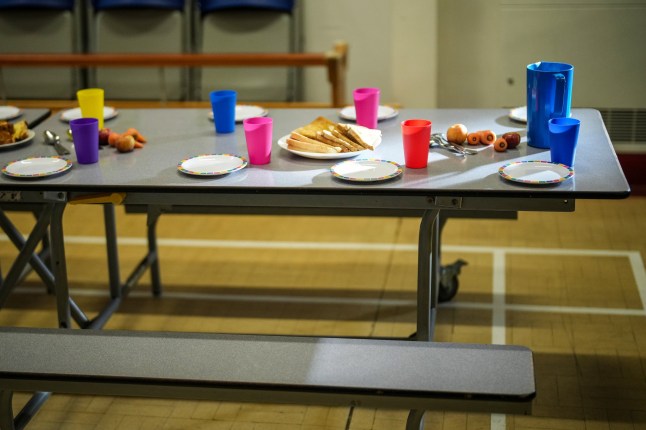
Daniel Kebede, general secretary of the National Education Union (NEU), said that many children in families who just miss out on being eligible for universal credit will also ‘miss out on a hot, healthy school meal’.
Mr Kebede added: ‘Ensuring that a free school meal is available to all children is the next urgent step that must be taken.’
The Liberal Democrats said this is ‘only a first step’ towards helping children in poverty but welcomed the change as a ‘victory for thousands of passionate campaigners’.
The party has called for the lifting of the two-child benefit cap, and capping uniform costs to help ease further poverty.
Get in touch with our news team by emailing us at webnews@metro.co.uk.
For more stories like this, check our news page.
4 Jun, 2025 | Admin | No Comments
Martin Lewis says 400,000 Brits are due £1,000s in council tax refunds — could you be owed money?
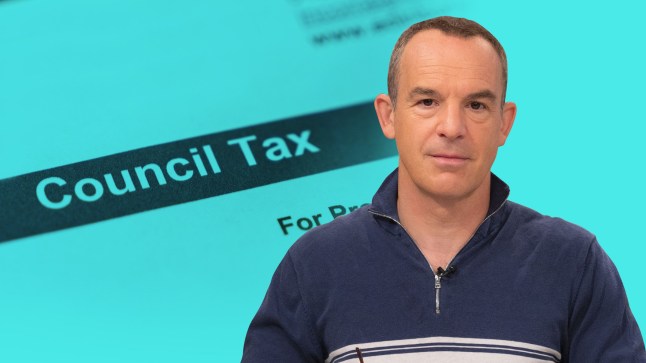

According to Martin Lewis, up to 400,000 UK households are overpaying their council tax — and could be due a sizeable refund as a result.
In the latest edition of his Money Saving Expert (MSE) newsletter, the consumer champion described the council tax system as ‘broken’, adding: ‘We still rely on a supposedly stopgap valuation done 34 years ago, to dictate what band a home’s in… even though much of the country is now unrecognisable compared to then.’
Last month, when he interviewed senior Cabinet Office minister Pat McFadden on Good Morning Britain, he was told the Government would soon be launching a consultation on the issue.
In the meantime however, Martin shared practical advice to make sure you’re paying the right amount, along with how to claim any money back you may be owed.
Check if your home is in too high a band
First off, Martin explains that, in England and Scotland, current council tax bands (from A to H) were decided back in 1991.
But in order to urgently get the system up and running, many homes were classified through ‘second-gear valuations’, with estate agents driving down streets and ‘allocating each property a band with just a glance’.
Although a full valuation was done for Welsh properties in 2005, almost half a million Brits could still be in the wrong band.

While you can’t ask for your band to be lowered, you can ask for it to be reassessed. And whether you should do so depends on whether you pass both of these simple tests:
- The neighbours check: You may feel comfortable enough to ask your neighbours for their band to see if yours is wildly different, but you can also look up your postcode via Gov.uk in England or the SAA website in Scotland.
- The valuation check: ‘The first check indicates something’s wrong, but is it that your band’s too high, or theirs too low?’ writes Martin. He recommends you first assess your home’s value (either based on what you paid for it or through house price websites like Zoopla Rightmove and Nethouseprices) then use this MSE tool to see what it was worth in 1991 — and thus which band it should be in.
Challenge your council tax band
Providing these indicate your home is in a higher band than it should be, the next step is to challenge its valuation with your local council.
Bear in mind though, Martin stresses the importance of passing both of the checks, as ‘even if you pass the neighbours check, you may be in a higher band than neighbours because theirs is too low, not yours too high. Challenge and you risk seeing their band rise, which won’t make you popular.’
If you’ve lived in the property for six months or less, or if the property has fundamentally changed within the same timeframe, you can submit a formal challenge. You can still submit an informal challenge if you live in England and Wales and don’t meet these requirements — it’s just a bit trickier.
Then, collect the following evidence to show the council that you’re likely overpaying:
- Your ‘Property Attribute Details’ (PAD) which can be obtained from the Valuation Office Agency (VOA) and includes factors like its age, type, floor area, number of bedrooms, living rooms, bathrooms and number of floors. This document isn’t available in Scotland, so Martin advises: you to ‘think about similar factors for your home, as they’re what really counts.’
- Addresses of similar properties nearby. These should be on the same street or estate (up to a maximum 10-mile radius in very rural areas), have the same style or features, and be of a similar age and size.
Once you’ve sent in the challenge, the council will decide whether your home’s band should be lowered. If they do, you’ll be offered a backdated rebate from when you moved into the property or 1993, whichever is later).
But not every challenge will be successful.
Martin does note that you can appeal a formal challenge rejection ‘if you have very strong reason to think the VOA is wrong’, either through a Valuation Tribunal in England and Wales or the Local Taxation Chamber in Scotland.
However, the financial guru adds: ‘If it’s an informal challenge and it’s turned down, you can’t appeal and that’s probably it – unless you find further evidence to support a new review (in which case, you’ll need to start the process again).’
Either way, you’ve got nothing to lose, and MSE followers have managed to snag rebates worth upwards of £3,000, so it’s worth a look.
Do you have a story to share?
Get in touch by emailing MetroLifestyleTeam@Metro.co.uk.

Aldi has pledged to keep its own-brand baby formula at £6.99 a tin for ‘at least’ the rest of the year.
The supermarket made headlines last year after cutting the price within 48 hours of Iceland announcing its own plans to make milk more affordable for parents.
Their Mamia milk is now even cheaper, and they say it is £5 less than the average sold elsewhere.
Infant formula is required by law to meet the same standards, so all brands will give roughly the same nutrition, although some use goat milk or organic ingredients. However, the high price of formula has been in the spotlight, following Metro’s Formula for Change campaign in partnership with the charity Feed.
In April, the team went to parliament with over 100,000 signatures, urging for changes in the law to make it more accessible and affordable.

The campaign urged the government to ‘give retailers the green light to accept loyalty points, grocery vouchers provided by foodbanks and local authorities, and store gift cards as payment for infant formula’.
Following Competition and Markets Authority (CMA) recommendations, the government is expected to make an announcement soon about what they will do to help parents with formula costs.
Since 2021, the cost of formula has skyrocketed. The most expensive brand on the market, Aptamil Advanced, is now sold for £18 a tub.
Desperate parents have been reduced to watering it down, going hungry themselves, and even stealing tubs off shop shelves, to ensure their babies get fed.
While the World Health Organisation recommends exclusively breastfeeding for the first six months of a baby’s life, there are many reasons why a parent might not do that, from adoption and cancer treatments to personal choice.
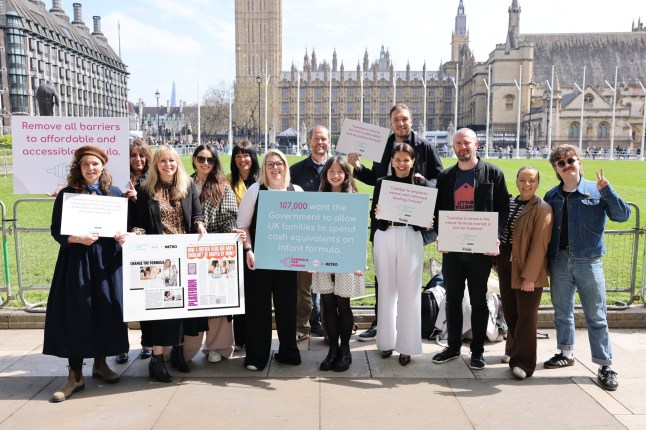
In February, the CMA released a report which found prices for infant formula increased by over 25% between March 2021 and April 2023.
It said this could be due to ‘weak or ineffective competition’, with sellers not given enough incentives to offer it at lower prices.
There are also ‘limited own-label alternatives’, unlike for most other groceries, it added.
They recommended that shoppers should be able to use loyalty points and gift cards to buy formula, although said the restrictions on advertising and promotions should remain.
Aldi, the UK’s fourth largest supermarket, said it made the commitment ahead of the government’s expected response to the report.
Julie Ashfield, Aldi’s chief commercial officer, said: ‘Shoppers should not be paying over the odds for the essentials.
‘As the UK’s cheapest supermarket, we’re committed to keeping prices low on the products our customers rely on most.
‘As formula prices remain at historic highs across the market, we want to reassure parents that at Aldi, there will be no unwelcome surprises at the checkout – we’re keeping our Mamia First Infant Formula at just £6.99 for at least the remainder of this year.’
Get in touch with our news team by emailing us at webnews@metro.co.uk.
For more stories like this, check our news page.
2 Jun, 2025 | Admin | No Comments
Trump administration open to allowing Iran to continue some uranium enrichment: report
A report from Axios has indicated that the United States plans to allow Iran to continue limited low-level uranium enrichment on its soil for an unspecified period of time.
On Saturday, the Trump administration presented its first formal proposal to Tehran in an attempt to sign a nuclear deal with the country, but did not share any details of the proposed deal publicly. “President Trump has made it clear that Iran can never obtain a nuclear bomb,” Press Secretary Karoline Leavitt said over the weekend. “Special Envoy Witkoff has sent a detailed and acceptable proposal to the Iranian regime, and it’s in their best interest to accept it.”
The report, from Axios, cited two sources familiar with the Trump administration’s ongoing negotiations with Iran. The White House did not deny the details of Axios’ reporting when Fox News Digital reached out for confirmation.
IRAN CONDEMNS AUSTRIA OVER REPORT ON ADVANCED NUCLEAR WEAPONS PROGRAM
Instead, a White House official responded with a statement calling the terms of the deal “very tough” and insisted the terms of the deal prevent Iran from obtaining nuclear weapons.
“President Trump is speaking the cold, hard truth. The terms we gave Iran were very tough and would make it impossible for them to ever obtain a nuclear bomb,” the official said.
Media reports Monday said that Iranian officials were planning to reject the U.S.’s proposed deal. The new details reported by Axios might serve to assuage some of the Iranians’ concerns, but could also anger some Republicans, as well as Israeli Prime Minister Benjamin Netanyahu, who have all expressed that they only want zero nuclear enrichment as part of the deal – in addition to full dismantlement of Iran’s nuclear program.
WHITE HOUSE URGES IRAN TO ACCEPT NUCLEAR DEAL AS IAEA REPORTS URANIUM ENRICHMENT SPIKE
Axios reported that the details of the proposal described to them indicated that Iran would not be allowed to build any more new enrichment facilities, must “dismantle critical infrastructure for conversion and processing of uranium,” and would be forced to halt any new research and development on nuclear centrifuges. However, according to the details of the proposal reported by Axios, Iran will be allowed to participate in a regional enrichment consortium under certain conditions.
For example, Iran will only be able to develop domestic enrichment capabilities for civilian purposes only, according to Axios. Meanwhile, after signing the agreement, Iran would be forced to reduce its enrichment concentration to 3% and shut down all underground enrichment facilities for an agreed-upon time period by both parties.
CLICK HERE TO GET THE FOX NEWS APP
The new proposal also seeks to develop auditing and oversight mechanisms to ensure Iran follows the rules of the agreement.
2 Jun, 2025 | Admin | No Comments
Fox News Politics Newsletter: Fetterman Draws the Line with Dems on Border
Welcome to the Fox News Politics newsletter, with the latest updates on the Trump administration, Capitol Hill and more Fox News politics content.
Here’s what’s happening…
Both Pennsylvania Democratic Sen. John Fetterman and GOP Sen. Dave McCormick spoke in a bipartisan forum about the importance of border security, with Fetterman going so far as to call out his own party on the issue.
“I’ve kind of, I’ve lost some support in my party. I thought the border was really important, and our party did not handle the border appropriately,” Fetterman told “Fox News Sunday” host Shannon Bream during a FOX Nation presentation of The Senate Project series on Monday.
“Look at the numbers, 267,000, 300,000 people showing up at our border. And, you know, we can all agree that’s roughly the size of Pittsburgh. Now, that’s unacceptable. And that’s a national security issue. And that’s chaos. So a secure border, being very pro-immigration, that’s who I am as a Democrat.”…READ MORE
YOU’RE FIRED: Trump admin unveils DOGE aligned rule streamlining process to fire federal workers for misconduct
‘REALLY NOT LEAVING’: Will the Trump Cabinet undo Musk’s DOGE legacy now that he’s gone?
‘SUICIDAL MIGRATION’: Boulder terror attack puts Biden-era immigration policies in the hot seat: ‘Must be fully reversed’
‘I’M VERY ANGRY’: Jewish House lawmaker urges deportation of Boulder terror suspect’s family
‘RAMPANT’: Fetterman, McCormick react to ‘astonishing’ Boulder attack on pro-Israel group
IDEOLOGICAL VIOLENCE: Boulder, Colorado suspected terror attack suspect Soliman faces murder, assault charges, jail records show
‘SUICIDAL MIGRATION’: Boulder terror attack puts Biden-era immigration policies in the hot sea
ANTI-AMERICAN’: Trump says Boulder terror attack ‘will not be tolerated,’ deportations must continue
NONCITIZEN: Alleged Boulder terrorist overstayed visa, granted work permit by Biden administration
TERROR IN BOULDER: Holocaust survivor among victims in Boulder, Colorado suspected terror attack
TENSION IN TURKEY: Ukraine, Russia meet for peace talks in Istanbul after explosive weekend
DECEIT REVEALED: Tensions rise as Israel strongly denies firing on Palestinians at Gaza humanitarian site
NATIONALIST COMEBACK: Polish conservative Karol Nawrocki wins presidential election to succeed Duda
‘DEFAMATORY ALLEGATIONS’: China accuses Hegseth of espousing ‘Cold War mentality’ for labeling country as a threat
IN HOT WATER: Maxine Waters campaign to pay $68,000 for violating campaign finance laws
‘UNREAL’: Marjorie Taylor Greene slams FDA green lighting of mNEXSPIKE COVID-19 vaccine
FIXING THE UNFIXABLE: As Musk exits DOGE, a look back at previous efforts to cut waste, fraud, and abuse — and how they fared
APPEALS DENIED: Supreme Court declines to examine appeals over Maryland, Rhode Island gun control laws
DEI DOLLARS: Hundreds of millions in tax money goes to contracts for DEI groups, watchdog finds
‘UPS THE ANTE’: US government taking ‘dramatically different approach’ using terrorism charges against drug cartels: FBI alum
Get the latest updates on the Trump administration and Congress, exclusive interviews and more on FoxNews.com.
2 Jun, 2025 | Admin | No Comments
High school girls stage protest after trans athlete wins 2nd straight state track championship
Veronica Garcia’s state championship is being met with tons of backlash.
Garcia, a senior at East Valley High School in Spokane, Washington, took home the girls’ 400-meter 2A state title on Saturday. Garcia is a transgender female.
Garcia, according to the Seattle Times, was heckled before the race and was booed after it.
CLICK HERE FOR MORE SPORTS COVERAGE ON FOXNEWS.COM
But the criticism did not end on Saturday. With students back at school after the weekend, high school girls decided to take matters into their own hands.
Numerous girls from Tumwater High School in Tumwater protested during school hours with a large banner sign that read, “This is not a walk out (sic). We are not going anywhere.”
Other signs read “XX,” “protest female sports” and other similar messages.
The Washington Interscholastic Activities Association (WIAA) issued the following statement to Fox News Digital: “The WIAA continues to proudly represent the 225,000+ student-participants across the state. The Association is aware of the protest by Tumwater HS students.”
The Tumwater girls’ team finished in third place in the meet. Reese Heryford finished in 15th place in a preliminary run for the 400 meters, failing to be in the necessary top eight to qualify for the final.
Garcia said the boos were “expect[ed].”
“I’ll be honest, I kind of expect it,” Garcia told the Seattle Times. “But it maybe didn’t have their intended effect. It made me angry, but not angry as in I wanted to give up, but angry as in I’m going to push.
“I’m going to put this in the most PG-13 way. I’m just going to say it’s a damn shame they don’t have anything else better to do. I hope they get a life. But oh well. It just shows who they are as people.”
Garcia, who ran the race in 55.70 seconds, won by over a full second. That time would have been the slowest by any boy, even in the preliminary rounds. Garcia also won a state championship last year and complained about the lack of sportsmanship from fellow competitors.
Garcia’s victory came roughly a week after the Quilcene School District in Washington voted, 3-2, to keep sports competition based on athletes’ birth gender, a move that defies state law.
The WIAA, enacted in 2007, allows transgender students to participate based on their gender identity.
President Donald Trump signed an executive order in February to keep biological boys out of girls’ and women’s sports, but Washington State Superintendent of Public Instruction Chris Reykdal, who once said it would be “inaccurate” to say there are only two genders, said the order defies state law.
Follow Fox News Digital’s sports coverage on X, and subscribe to the Fox News Sports Huddle newsletter.
2 Jun, 2025 | Admin | No Comments
Ashley Biden slams reporting about her dad's mental acuity as 'disrespectful and untrue'
Ashley Biden, daughter of former President Joe Biden, had harsh words for what she called “DAMN disrespectful and untrue” reports about her father’s age on Monday.
In an Instagram post, Ashley Biden shared a picture of herself with her parents, the former president and former first lady Jill Biden, on a beach, saying she was “too grateful to be angry about all the bulls—.”
“The ONLY coverup of this family is a BEACH coverup,” Ashley Biden wrote.
She defended her father, saying that he gave his all as president and pushed back on reporting in books like “Original Sin” that he was mentally declining while in office.
‘ORIGINAL SIN’ CO-AUTHOR EXPOSES ‘FRANTIC EFFORTS’ TO HIDE BIDEN’S COGNITIVE DECLINE
“He aged, YES! As we all do! And the stress of the presidency accelerates. But he was always MORE than capable of doing the job. And a damn good one. He worked harder than anyone I have ever known – he took his duty and sacred obligation to this country very seriously,” she wrote.
Although she did not mention Axios’ Alex Thompson and CNN’s Jake Tapper’s new book by name, she called out what she referred to as recent “noise” from “fake news” about Biden.
“The noise is so DAMN disrespectful and untrue… AND, it’s just that – noise/static – created by those committed to perpetuating and profiting from some real BS. Get lost with your anonymous sources and fake news,” Ashley Biden wrote.
She added that she was grateful for the support her family had received after the former president’s prostate cancer diagnosis was revealed last month.
CLICK HERE FOR MORE COVERAGE OF MEDIA AND CULTURE
Ashley Biden’s comments came a few weeks after Biden’s granddaughter Naomi Biden rebuked the book directly in an X post.
“Just read a copy of this silly book, and if anyone is curious for a review from someone who lived it first-hand: this book is political fairy smut for the permanent, professional chattering class. The ones who rarely enter the arena, but profit from the spectacle of those that do. Put simply, it amounts to a bunch of unoriginal, uninspired lies written by irresponsible self promoting journalists out to make a quick buck,” Naomi Biden, Hunter Biden’s daughter, wrote.
She claimed the book relied on “unnamed, anonymous sources pushing a self-serving false narrative.”
Thompson and Tapper’s book, “Original Sin: President Biden’s Decline, Its Cover-Up, and His Disastrous Choice to Run Again,” revealed efforts by his administration to allegedly cover up Biden’s mental and physical decline while in office.
Brooke Shields is proving age is just a number with new social media posts.
The “Mother of the Bride” star took to Instagram over the weekend to celebrate her 60th birthday with photos of her lounging on the beach in her bikini.
“Woke up today in paradise… and in a new decade of life! This is 6️⃣0️⃣! Thank you for all of the birthday love,” she captioned the post.
The photos featured Shields sitting in a hammock on the shore in a black bikini, which she accessorized with a sun hat and a chunky gold chain choker and sand-covered feet.
BROOKE SHIELDS LIVED IN ‘AGONY’ OVER LATE MOTHER’S ALCOHOLISM
Her famous friends quickly flooded the comments sections with well-wishes, with Christie Brinkley writing “Happy Birthday Beauty 60 looks GREAT on you,” and Ricki Lake adding, “Yes Queen! Happy milestone Birthday!”
In a separate Instagram post, shared on the account of her haircare brand, Commence, Shields spelled out “propaganda we’re not falling for” anymore, writing in the caption, “We’re not making any more time for nonsense.”
“That 60 means slowing down. That change is only for your twenties,” the list written on the screen said. “That it’s too late to learn something new. That my best days are in the rearview. That women ‘of a certain age’ aren’t a force to be reckoned with. That I don’t deserve products made specifically for me. That not every day can be a good hair day.”
Shields is no stranger to sharing bikini photos. The star took to Instagram in April, to share photos from her time in the Bahamas, in which she posed on the beach in a black and white bikini.
LIKE WHAT YOU’RE READING? CLICK HERE FOR MORE ENTERTAINMENT NEWS
Having started her career at a young age, Shields has often spoken out about how difficult it was to grow up in the spotlight, telling AARP The Magazine in March 2024 she felt as if beauty “was a burden and a responsibility,” but that now it “means freedom.”
“The ‘Pretty Baby’ documentary definitely empowered me,” she explained. “I had never seen my life in its entirety. It made me feel very proud of my resilience and that little girl. I would be shocked as a kid to know that there would come a time that I would feel like I was enough. I would be shocked if I knew that I would one day really be confident and like myself.”
The 2023 documentary, “Pretty Baby: Brooke Shields,” chronicled the actress’ life as a sexualized young actress and model, “to a woman who embraces her identity and voice,” according to the description on Hulu.
When speaking with AARP The Magazine, she explained she has grown accustomed to hearing other people’s opinions about her appearance, saying “it’s an affront to people if Brooke Shields gets older.”
CLICK HERE TO SIGN UP FOR THE ENTERTAINMENT NEWSLETTER
“You can’t grow up, you cannot age. It’s disappointing to them that I don’t have the same face I had when I was 16,” she said. “But it’s been so liberating for me not to worry about it all the time. The pressure of being skinny is just so exhausting. I like food, and I like tequila!”
She further discussed aging in Hollywood in her memoir, “Brooke Shields Is Not Allowed to Get Old.”
